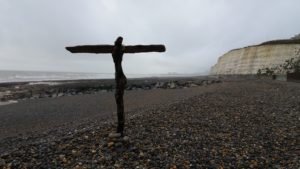I’m feeling much better today. I slept well, then entered the routine. Physio exercises, walk, work. Trying to focus on how I am going to spend this period of time, and make the most of it.
I was surprised how emotional I felt yesterday. I’ve given talks on the POW experience and read countless accounts of solitary; yet I felt myself overwhelmed with grief and horror about even this mild captivity.
The problem at the moment is uncertainty. I’d originally prepared myself for a 21-day social distancing period. The Prime Minister said 12 weeks yesterday. And reports via the Scientific Advisory Group for Emergencies are talking about longer. But however long it is, if it keeps people alive, then we must do it.
I’m focussing on making the most of the quiet time, but I am also preparing myself for something that is, initially, open ended. I remember reading about the imprisonment of James Stockwell in Vietnam. The challenges we face are far less than what Stockwell faced, but he came out of his horrific experiences saying:
I never lost faith in the end of the story, I never doubted not only that I would get out, but also that I would prevail in the end and turn the experience into the defining event of my life, which, in retrospect, I would not trade.
Stockwell also spoke about the dangers of baseless optimism, giving rise to what is known as the Stockwell Paradox:
You must never confuse faith that you will prevail in the end—which you can never afford to lose—with the discipline to confront the most brutal facts of your current reality, whatever they might be
We could be here for a while. The pubs are closing tonight, and it will be some time before they open again. But there are simple choices to be made here. There are things to be created. There is joy, sadness and isolation to share. There are friends to be made via the Internet who we can look forward to seeing.
(I recently started reading Katie West’s Better than IRL, a collection of accounts of Internet friendship and community, and it’s an inspiration for these times).
I do hate a lot about this. The empty supermarket shelves drive fear and panic into my heart. I am scared of not being able to buy hand-sanitiser or paracetamol. The current reality might be unfair and brutal, but we will get out. And I’d like to look back on this as a postive experience.
I was talking to Rosy last night about the use of war metaphors for this epidemic. Naturally, we’re both suspicious of them, but I am inspired by the idea of the world coming together for a common cause. The sacrifices we have to make to save lives are relatively cheap. Let’s beat this, then get on with the climate crisis.
Meanwhile, I will cut down on the news updates I read to focus on the official briefings and a single daily news update. The problem with the news cycles is that stories change quickly, unleashing a range of emotions before the facts settle down. Things will be much clearer soon.
I’m not sure how long I’m going to keep up a daily post, but I want something to document how I feel about this period. Writing it as a blog allows me to share it with the world (well, with my small number of followers), and makes it more real.
My plank today was up to 103 seconds. I was originally reckoning I could get 5 minutes by the time the crisis ends. Reckon I can make 10 before the pubs reopen.



















